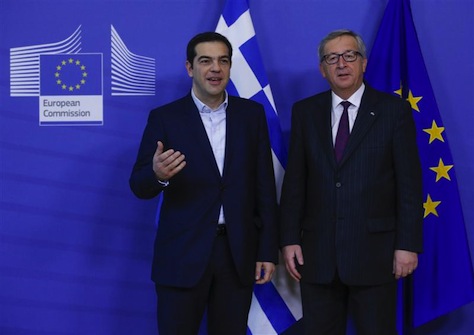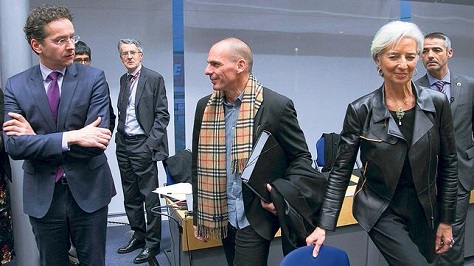 Photo credit to ELTOS/ELTA.
Photo credit to ELTOS/ELTA.
It may have seemed odd that, within hours of taking office, Greece’s new prime minister Alexis Tsipras struck out at the European Union to delay and ultimately weaken the bloc’s resolution to extend sanctions against Russia and certain actors within the Russian government.

The incident shed light on an under-explored element of policy preferences of Greece’s new governing party, the leftist SYRIZA (the Coalition of the Radical Left — Συνασπισμός Ριζοσπαστικής Αριστεράς), including its reluctance to embrace NATO and the traditional military and security alliance that links the United States and the European Union. Tspiras, who has visited the Kremlin several times, has forcefully opposed the EU sanctions against Russia stemming from its involvement in the unrest in eastern Ukraine.
Furthermore, Tsipras’s choice to form a coalition with the right-wing, anti-austerity Independent Greeks (ANEL, Ανεξάρτητοι Έλληνες), and to appoint ANEL’s leader, Panos Kammenos, as defense minister, brought into government a brand of right-wing nationalism with roots in traditional Greek Orthodoxy and plenty of euroscepticism.
Throughout the campaign and, indeed, for years, Tspiras has publicly evoked confidence, if not outright cockiness, that he would be able to negotiate a deal to lighten Greece’s debt load if elected to power. Presumably, many commentators believed that meant Tsipras was willing to engage EU elites, including German chancellor Angela Merkel, in a game of ‘chicken’ over Greece’s potential exit from the eurozone. That’s probably still true.
But the common view among most economists is that Greece’s leverage on this point is growing weaker. Merkel and others have privately briefed that the eurozone is much stronger now than in 2012 when the ‘Grexit’ issue first became a real concern, and they don’t believe that the contagion from a Grexit today would be considerable. Greece’s turmoil can be isolated, but caving to the demands of the Tsipras government could embolden radical leftists elsewhere in Europe, especially in Spain, where the leftist Podemos movement now leads polls in advance of elections later this =year. The European Central Bank last week essentially backed Merkel’s view by announcing that it would refuse to accept Greek bonds as collateral, pushing the burden of risk on Greek debt exclusively upon the Greek central bank. Greek finance minister Yanis Varoufakis clashed publicly with German finance minister Wolfgang Schäuble last week as well, noting that he didn’t even ‘agree to disagree’ with Schäuble over the Greek debt standoff.
But Kammenos’s comments yesterday about Greece’s ‘Plan B’ make it clear that the Tsipras government believes it has another, potentially more explosive card it can play:
“What we want is a deal. But if there is no deal – hopefully (there will be) – and if we see thatGermany remains rigid and wants to blow apart Europe, then we have the obligation to go to Plan B. Plan B is to get funding from another source,” he told a Greek television show that ran into early Tuesday. “It could the United States at best, it could be Russia, it could beChina or other countries,” he said.
The United States is certainly not going to undermine Merkel and the EU leadership, especially to bail out a far-left government in Greece. Furthermore, China’s recent history demonstrates that it very rarely makes splashy political moves in foreign policy outside regional Asian politics (such as in Bhutan or Sri Lanka).
That, of course, leaves Russia, which shares a common form of Christianity with Greece in Orthodoxy, and which also happens to be in the middle of the most high-stakes geopolitical struggle with NATO since the end of the Cold War. Continue reading A Russian bailout may have always been ‘Plan B’ for Tsipras →
![]()
![]()

